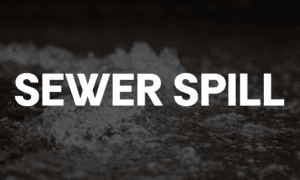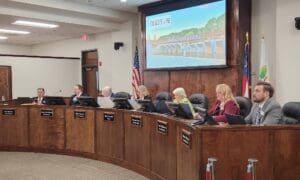Melinda Jennings has been a nurse for a long time. Prior to recently taking a job as a school nurse at Sara Harp Minter Elementary, the BYU Nursing School gradate had been an operating room (OR) nurse at Piedmont Fayette Hospital. Helping people who are sick and helping those that are tasked with healing them is just something she loves. When the BYU Nursing School and LDS charities sent out a call looking for nurses in all fields to go on a mission unlike any other, Jennings knew she had to try to be a part of the trip. Over 700 people applied and 100 were accepted to be part of 35 member rotations to join a Naval hospital ship headed to islands in the Pacific for a Disaster Relief and Response Exercise.
The trips to the Pacific started after the tsunami and serve as a way to bring humanitarian aid to those who need it and continue to improve relations. Jennings was accepted and was part of the Indonesian rotation, which lasted through July.
In addition to the servicemen and women aboard the ship, the USNS Mercy, there were NGOs (non-governmental organizations) including dental students, doctors, nurses, veterinarians and engineers, as well as Indonesian interpreters, nurses and more. Jennings had wanted to go on a mission to Central America but shelved it soon after 9/11. The time felt right this time, even though she would be leaving her husband and children for a month.
“Only me and an EMT were leaving children behind on this trip,” Jennings said. “The rest of the people like us were either younger and without kids or empty nesters.” It was an opportunity that Jennings did not want to pass up and her family was very supportive. She was able to keep in touch with them frequently with phone calls, e-mail and a daily blog post that chronicled her trip.
It took 30 hours to get from Atlanta to Singapore where Jennings met up with the Mercy and once on board she saw the tight bunk space she would be sleeping in.
“I’ve got a bit of claustrophobia,” Jennings said. “The bunks were only two feet high and I just couldn’t draw the curtains all the way. It took me about a week to sleep though the night.”
Busy days helped that along. Jennings and her colleagues on board mustered at 6:30 a.m. at port and 7:30 a.m. at sea and muster meant that they had to have eaten breakfast and be ready to go. The rotations prior to the one Jennings was on had 418 surgeries and 879 patients on board, saw 48,000 people in outreach clinics on land and attended to 1,059 animals.
The Mercy made three stops in Indonesia, one that was four days long and two that were seven days long. The four day long stop limited what surgeries they were able to provide as the patients had to be fully recovered by the time the Mercy was ready to leave. Candidates for surgeries were screened by search teams on the first day of each stop.
In Mortai, Indonesia, Jennings and her colleagues got their first patients. There was a lot of cleft palate surgeries, cataract surgeries, hernia surgeries, hysterectomies and removals of masses and ganglion cysts. There were five operating rooms up and running and Jennings worked 15 surgeries in the first two days of a four day stop.
“If you run out of supplies, there are no more,” Jennings said, discussing one of the main differences. “You can’t just have someone run out and get something or have it sent over. If we don’t have it, you have to create it. Reuse, make do or do without.”
Jennings added that another thing that struck her was how they saw a lot of things that people in the US would never let progress as far as the patients over there did. There are 6,000 populated islands in Indonesia and roughly one doctor for every three islands, so many people over there just don’t have the opportunity to get things fixed.
It was clear to everyone on board that they were helping a lot of people. One little girl who had never seen before had cataracts removed from both eyes and had some vision restored. Overall, there were 53 surgeries done in the four day stop on the island of Moratai, 5,676 patients were seen ashore and 155 animals were tended to do.
After Moratai, Jennings got to be part of a team searching for surgical candidates in Ternate, an island with an active volcano that erupted in 1986. Jennings and several others got to spend some time off the boat in Ternate, where they saw a bamboo ceremony, a fortress, the sultan’s palace, the beach and more. Jennings didn’t think that too many Americans ever get to Ternate because the people there gave her and her colleagues the star treatment, following them around and taking their pictures. In Ternate, there were 78 surgeries performed, while 10,500 patients were seen on shore, 6,000 pairs of glasses were given out, a medical clinic was renovated and 200 animals were treated.
One of the most interesting experiences for Jennings was when the ship crossed the equator and she and the other NGOs who chose to participate got to take part in the “Crossing the Line” initiation. Prior to the ceremony, the initiates were referred to as polliwogs but after a four hour round of light hazing, featuing lots of calisthenics and crawling around the ship, they became shellbacks.
Jennings also enjoyed touring the ship, meeting different people and seeing how everything worked. The Mercy, formerly an oil tanker was gutted and hospital modules were built on shore and placed into existing compartments. The ship is 894 feet long, holds over one million gallons of diesel fuel and 356,000 gallons of fresh water. One night Jennings got to attend a concert in Anbon featuring a rock band consisting of Navy members and she also got to join 24 other people from the Mercy on an Indonesian hospital ship, the Soeharso.
The trip ended and Jennings had a few days in Australia before heading back. There was plenty of time to reflect on her experience and look back on everything she and the rest of the people aborad the Mercy were able to accomplish.
Among the lessons Jennings learned while at sea and half way around the world were:
• Always look for opportunities to serve others. Those opportunities are there every day, but we must be looking for them.
• Don’t let your fears over take you. After 35 days of sleeping soundly in this small rack I have found that I can face my fears and not let my them conquer me.
• Never be afraid to live life to the fullest. I am have found that it is best to be a participant and not a spectator in life.
• Making new friends makes life so much better. I have met people from all over the world here on the Mercy and have enjoyed this time together and am a better person because of it. I believe that we can learn from all people.
If you’d like to read more abut Jenning’s trip and experiences, visit http://summerservice2010.blogspot.com/











Leave a Comment
You must be logged in to post a comment.